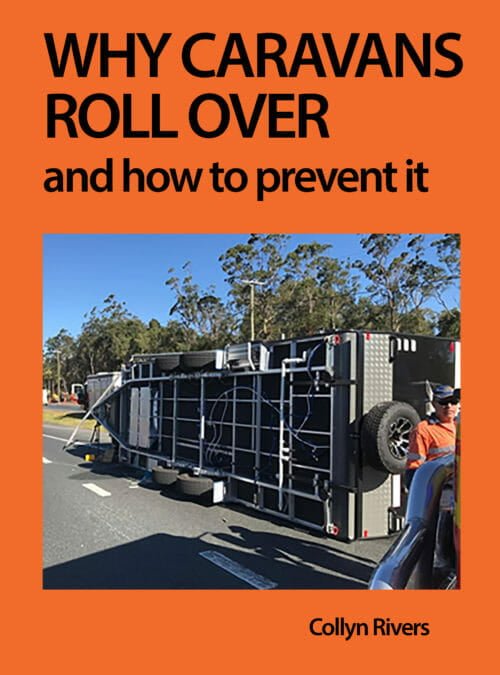This paper explains how overtaking a fast moving truck, or being passed by one can exert dangerous truck wind forces on caravans.
Roll
Caravan Length and Stability
For decades both caravan owners and vendors have emphasised the need for a laden tow vehicle to at least weigh as much as the laden caravan. Length and caravan stability, and where weight is distributed over that length, is now being seen as more significant.
Making stable caravans – here’s how and why to do it
Making caravans more stable is readily possible by design, loading, and tow vehicle use and choice. This article by Collyn Rivers explains how. It also provides practical guidelines for buying a caravan and tow vehicle, their loading and on-road usage. For a full technical explanation of why rigs can be unstable please see my Caravan and Tow Vehicle Dynamics/. See also Why Caravans Roll Over/
Caravan and tow vehicle dynamics
The complex interactions of caravan and tow vehicle dynamics are described here by Collyn Rivers. It is a precis of the rvbooks.com Why Caravans Roll Over – and how to prevent it.
Wheels falling off trailers – and how to stop it happening
Wheels falling off trailers, wheel studs breaking and wheel nuts loosening still happens. Here is why it happens, and how to prevent it. Wrecked wheel bearings and fractured stub axles are also common. That fastenings such as wheel nuts may be caused, not just permitted, to loosen is rarely covered in engineering training. The causes and prevention are however well known. This referenced article by Collyn Rivers explains how and why in rigour and detail.
Information for Book Retailers
The entire range of books published by RVBooks is available in paperback form for sales by bricks and mortar book retailers. Worldwide distribution for all books in the RVBooks library is managed exclusively by the Ingram Content Group. Ingram Content Group has one of...
Should I grease my tow ball?
Should I grease my tow ball is asked by caravan owners worldwide. A recent poll in Australia’s Caravanners Forum.com showed that slightly over half do so, but primarily to reduce wear. That seemingly overlooked by almost all respondents is that tow ball friction plays a vital role in reducing caravan sway. Those who grease them unwittingly prejudice safety for the possible need to renew the towball every ten or so years.
How caravan and tow vehicles interact
In the early 1900s, trailers with central axles, towed by trucks with overhung hitches, were unstable. This escalated as towing speeds increased. Fruehauf (USA) realised hitch overhang imposed lateral forces on tow vehicles. As trailers yawed clockwise, that overhang caused tow vehicles to yaw anti-clockwise. And vice versa. The longer that hitch overhangs, the greater the effect.
Caravan nose weight – it’s vital for safe towing
The current (February 2018) Australian RV rules and regulations are outlined here by Collyn Rivers of RV Books. Those for trailers under 4500 kg (9920 lb) will change in late 2018 but details are not yet available
Caravan design need for change
Australia has two main and seemingly interdependent caravan industries. One makes caravans of varying stability. The other makes devices (of varying effectiveness) intended to increase that stability. Both are curious. Not all makers appear to understand the more basic laws of physics involved. Or perhaps assume immunity from them. So presumably do owners of ultra-long caravans. With a few rare exceptions, there is a caravan design need for change. And for caravan owners to realise a caravan’s inherent stability issues.




